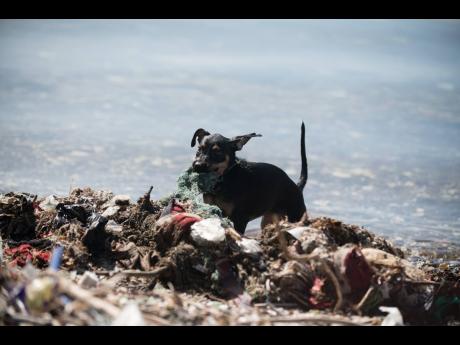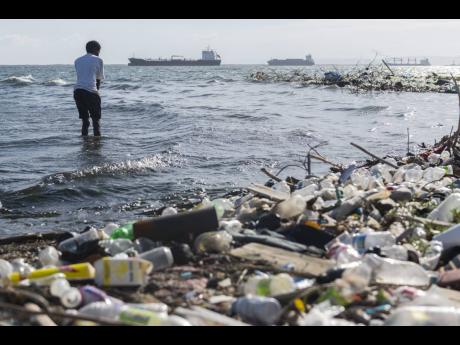Theresa Rodriguez-Moodie | Tackling Jamaica’s growing plastic problem
At a recent clean-up of Refuge Cay in Kingston Harbour, the depth of Jamaica’s plastic problem was painfully evident. Thick layers of plastic were entangled amidst the mangrove roots and floated in the nearby coastal waters.
Despite many efforts at beach clean-ups, public education campaigns and the plastic ban, Jamaican coastlines remain littered with carelessly discarded waste, often various forms of plastic. As a result, the Jamaica Environment Trust (JET) decided to embark up on a thorough reassessment of the situation, identifying critical gaps and proposing actionable recommendations. The study was done as part of a larger project funded by the UNDP implemented Global Environment Facility Small Grants Programme (GEF SGP).
Plastic packaging has saturated the world. While it is light and convenient for consumers, plastics do not biodegrade and only a small fraction produced ever gets recycled. After hundreds of years, plastic breaks up into tiny particles, which migrate up the food chain releasing toxins and chemicals. Almost every plastic item you have ever used still exists somewhere. Plastic pollution is now a global and local crisis impacting wildlife, ecosystems, and human health.
Plastic waste only accounts for about 16.8 per cent of the total waste collected in Jamaica, but it often dominates the garbage found along many of our coastlines, rivers, gullies and roadsides. The 2023 International Coastal Cleanup Day National Report highlighted that plastic beverage bottles and bottle caps are the two most commonly collected items for the 16th year in a row.
A ban on certain single-use plastics, including specific plastic bags, straws, and polystyrene foam containers, was enacted in 2019 when marine litter started significantly impacting the tourism and fisheries sectors. Effective June 2024, the ban will be expanded further to include plastic lunch boxes and personal care items with microplastics. Plans are also underway to formulate a national policy addressing the Environmentally Sound Management of Single-use Plastic Products.
KEY LOCAL CHALLENGES
The recent evaluation by JET exposed significant shortcomings in Jamaica’s legal and policy framework for solid waste management. Despite over two decades since the enactment of the National Solid Waste Management Authority (NSWMA) Act, there remains a glaring absence of enabling regulations for licensing and oversight of private entities engaged in waste collection and disposal. The NSWMA continues to operate in a dual capacity as regulator and operator, with inadequate waste collection infrastructure, weak enforcement mechanisms, no tipping fees and no sanitary landfills. There is also no industrial composting facility on the island despite the high organic composition of Jamaica’s waste.
PRIMARY RECOMMENDATIONS
Addressing Jamaica’s solid waste management crisis and mitigating plastic pollution demands a multifaceted approach:
- Sustainable financing
- Exploration of private sector involvement in waste collection, transportation, and disposal to stimulate investment and enhance efficiency.
- Enactment of regulations under the NSWMA Act to establish tipping fees based on waste by weight/type and licensing fees for private sector contracts.
- Consideration of public-private partnerships to establish industrial composting facilities.
- Establishment of sanitary landfills and appropriate transfer stations.
• Plastic waste minimisation and diversion
- Set clear targets for reducing and recycling plastic waste, with long-term objectives and midterm benchmarks.
- Support private sector initiatives in recycling and resource recovery.
- Implement a national programme for source sorting/waste separation with supporting legislation for better compliance.
- Enact legislation mandating manufacturers and distributors of plastic bottles to participate in the Deposit Refund Scheme (DRS).
- Mandate labelling of packaging to certify items as non-plastic, biodegradable, or home-compostable, adhering to standards set by the Bureau of Standards.
- Introduce incentives for non-plastic consumer alternatives, including reduced import duties.
- Expand stakeholder involvement by including more representatives from the private sector, civil society, and relevant organizations in the current working group on plastic waste.
• Behavioural change and enforcement
- There should be continuous effort to build public awareness and education to promote plastic waste reduction. Current campaigns face financial challenges and need better funding. Education campaigns and programmes encourage responsible waste practices and strengthen adherence to waste management regulations but they need to be long term and consistent since the waste management problem is of such a major and long-standing nature.
- Strengthen monitoring and enforcement of existing laws and regulations governing waste disposal and littering.
Jamaica’s plastic problem will not effectively be addressed until a comprehensive solid waste-management policy is developed and implemented. This policy must embrace the concept of a ‘circular economy’ and integrate these recommendations, none of which are new, to ensure sustainable waste management practices for the nation’s future.
Danielle Andrade Goffe, attorney-at-law at Goffe Law contributed to this article.Theresa Rodriguez-Moodie, PhD, is an environmental scientist and the CEO of the Jamaica Environment Trust. Send feedback to jamaicaenvironmenttrust@gmail.com.



